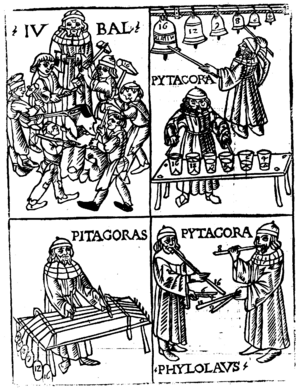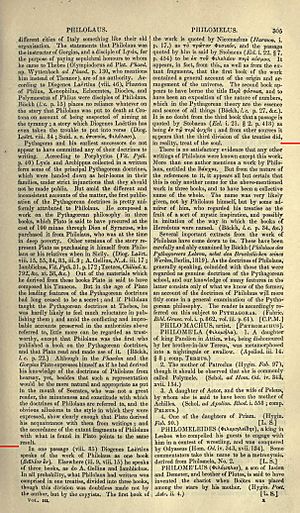Philolaus facts for kids
Quick facts for kids
Philolaus
|
|
|---|---|

Medieval woodcut by Franchino Gaffurio, depicting Pythagoras and Philolaus conducting musical investigations
|
|
| Born | c. 470 BCE |
| Died | c. 385 BCE |
| Era | Pre-Socratic philosophy |
| Region | Western philosophy |
| School | Pythagoreanism |
|
Main interests
|
|
|
Notable ideas
|
|
|
Influences
|
|
|
Influenced
|
|
Philolaus (/ˌfɪləˈleɪəs/; Ancient Greek: Φιλόλαος, Philólaos; c. 470 – c. 385 BCE) was an ancient Greek philosopher. He was a follower of Pythagoras, a famous thinker who combined mathematics with spiritual ideas. Philolaus was born in a Greek colony in Italy and later moved to Greece.
He is seen as one of the most important figures in the Pythagorean tradition. Philolaus may have been the first to write down the ideas of Pythagoras. Most of what we know today about the Pythagorean view of the universe comes from Philolaus's ideas.
Philolaus believed that everything in the universe is made from a mix of "limiting" and "limitless" things. He also famously argued that the Earth was not the center of the Universe. This idea was very new at the time. He suggested that a "Central Fire" was at the center of the universe. He thought that the Earth, Sun, Moon, and planets all moved around this Central Fire. This was an early step towards the idea of heliocentrism, which says the Sun is at the center.
Contents
Life of Philolaus
Philolaus was likely born in Crotone, a Greek colony in Southern Italy. He later moved to Greece. This might have been to escape trouble, perhaps after a fire at a Pythagorean meeting place around 454 BC.
He taught students like Simmias and Cebes in Thebes. This happened around 399 BC, which means he lived at the same time as the famous philosopher Socrates. Some ancient writers also say that Philolaus and Democritus were alive at the same time.
Later writers mention that Philolaus lived for a while in Heraclea. There, he was a student of someone named Aresas. Some stories, which are not always certain, say that Plato met Philolaus in Italy. Philolaus's students included Xenophilus and Echecrates.
Philolaus's Writings
Pythagoras and his early followers did not write down many of their ideas. It is believed that Philolaus was the first to publish a book about Pythagorean philosophy. He wrote a work that some sources say was one book, while others say it was three. It might have been one long work divided into three parts.
One of his main works was called On Nature. Another name for it might have been On the World. It is said that Plato, a very famous philosopher, got a copy of Philolaus's book. Some people even claimed that Plato used many ideas from Philolaus's book when he wrote his own work, Timaeus.
Even though there are different stories about how Plato got the book, it is generally believed that Philolaus was the first to publish a book on Pythagorean ideas. Plato then read and used these ideas.
How Philolaus Saw the Universe
Philolaus had a very interesting idea about how the universe worked. He was one of the first to challenge the common belief that the Earth was the center of everything. This old idea is called geocentrism.
In Philolaus's system, the universe revolved around a "Central Fire". This was not the Sun, but a hidden fire at the very center. He believed that the stars, the five planets, the Sun, the Moon, and the Earth all moved in circles around this Central Fire.
He also thought there was a tenth unseen body called the Counter-Earth. He added this because the Pythagoreans believed the number ten was perfect. Without the Counter-Earth, there would only be nine moving bodies.
Philolaus's ideas about the Earth moving around a central point were very advanced for his time. Nearly 2,000 years later, Nicolaus Copernicus would mention Philolaus in his book, De revolutionibus. Copernicus noted that Philolaus had already thought about the Earth revolving around a central fire.
Philolaus's Philosophy
Philolaus believed that everything in the universe comes from two basic ideas: the "unlimited" and the "limiting." He said that if everything were unlimited, we wouldn't be able to understand anything. So, things need limits to be known and understood.
He thought that these two ideas combine in a special way to create harmony. This harmony is what makes the universe an ordered and beautiful place.
See also
 In Spanish: Filolao para niños
In Spanish: Filolao para niños
- Alcmaeon of Croton
- Apeiron
- Nicomachus
- Parmenides
- Protrepticus (Aristotle)
- Pythagoreans
 | May Edward Chinn |
 | Rebecca Cole |
 | Alexa Canady |
 | Dorothy Lavinia Brown |



